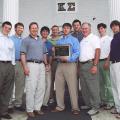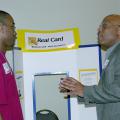Feature Story from 2005
MISSISSIPPI STATE -- Shandon Gifford feels honored to receive the Soldier's Medal for his heroic actions in the Iraq War, but he said the support he received during and after his service is more valuable than any award.
Gifford, who served as a medic in Iraq with the Mississippi National Guard's 223rd Engineering Battalion in 2003, is a surgical nurse with Mississippi State University's College of Veterinary Medicine. He was honored with the U.S. Army's Soldier's Medal during a special ceremony held at Camp McCain near Grenada July 15.
MISSISSIPPI STATE -- The Pontotoc Ridge-Flatwoods Branch Experiment Station will hold a research and demonstration tour on Aug. 4. Registration will begin at 7:30 a.m.
The station is located on Highway 15 about seven miles south of Pontotoc.
Research activities with corn, cotton, soybeans and sweet potatoes will be highlighted during the tour of the station’s research fields.
MISSISSIPPI STATE -- Beginning gardeners and old pros all will find something to like at the 2005 North Mississippi Garden Expo.
The Sept. 17 expo at the North Mississippi Research and Extension Center in Verona is free. Tours and other activities begin at 9 a.m. and continue until 1 p.m.
“Visitors can tour the Magnolia Botanical Gardens and other areas at the center devoted to fruits and vegetables, turf grass and ornamental plants,” said event coordinator Crofton Sloan.
MISSISSIPPI STATE -- Cooperative Demonstration Field Days will provide landowners, managers and others with opportunities to learn how to plant and manage dove food plots for legal fields to hunt over during upcoming seasons.
MISSISSIPPI STATE -- Cool, wet weather in the spring months gave Mississippi sod a slow start, but rains in June and heat in July helped the grass turn in an overall good performance.
“Things are going pretty well right now for the state's sod producers,” said Wayne Wells, turf specialist with the Mississippi State University Extension Service. “I've talked with producers, and they seem to be moving quite a bit of grass right now.”
MISSISSIPPI STATE -- The right tools give catfish producers an edge in the battle against production problems, and research is providing those tools.
Ongoing research at Mississippi State University's Thad Cochran National Warmwater Aquaculture Center focuses on several aspects of catfish production. Two major problems facing producers are trematode infestation and off-flavor. Researchers have found that one chemical applied in the correct dosage can help producers win battles against both problems.
MISSISSIPPI STATE -- Joe Street has been named the new head of the Delta Research and Extension Center, Mississippi State University's facility in Stoneville.
Street replaces Jimmy Smith, who served as head of the center for 11 years before requesting reassignment as research professor. Effective Aug. 15, Street will transfer from the North Mississippi Research and Extension Center in Verona to Stoneville.
MISSISSIPPI STATE -- A football game earlier this year raised enough money to give seven children with life-threatening illnesses an outdoor adventure of a lifetime.
The annual Kappa Sigma Charity Classic raised $20,000 from sponsors for one football game. The game pits these Mississippi State University students against members of Sigma Chi fraternity. The winner takes home bragging rights for the year, and the charity, the national Catch-a-Dream Foundation, is able to continue providing hunting or fishing trips for ill youth.
MISSISSIPPI STATE -- Wheat farmers weighing their options for fall plantings are finding the scales tipping less and less toward double-cropping methods.
In June, Mississippi wheat growers harvested a slightly below-average yield after battling stripe rust and water-logged soils much of the growing season. Fields averaged 48 bushels per acre, five fewer than last year. The state's growers planted 110,000 acres of wheat and harvested 95,000 acres for the fifth consecutive year of declining acreage.
MISSISSIPPI STATE -- Seeing, hearing and touching have their place in the learning process, and the best teachers know how to incorporate all of them in their lessons.
Some people like to handle something to learn about it, others want to hear information while still others prefer written instructions. Some people visualize abstract concepts well. The way a person likes to learn is often referred to as a learning style or a learning preference.
MISSISSIPPI STATE -- Middle and high school students are discovering that it is never too early to learn about finances with "reality checks" supplied by Mississippi State University's 4-H program.
Marianne Clark, Grenada County 4-H agent, is helping to bring a program called Reality Check to youth, and sometimes adults, needing help with life's financial lessons.
MISSISSIPPI STATE -- Weather conditions may prevent Mississippi's rice farmers from posting a third consecutive year of record yields, but their biggest battle may be economics.
MISSISSIPPI STATE -- Alan Blaine was named the interim head of the North Mississippi Research and Extension Center in Verona after its current head took another position within Mississippi State University.
MISSISSIPPI STATE -- A food allergy does not have to keep a student out of the cafeteria, but parents should work with the school in advance to develop a plan of action.
The National Institute of Health defines a food allergy as "an abnormal response to a food triggered by the body's immune system." Allergic reactions can cause serious illness and even death. The institute estimates 6 to 8 percent of children under the age of 3 and 2 percent of adults have true food allergies.
MISSISSIPPI STATE -- Mississippi State University Extension Service agronomists credit good management of diseases and a recent doubling of peanut acreage for what they expect to be Mississippi's largest peanut crop ever.
Still with fewer acres than most peanut-producing states, Mississippi growers have 20,000 acres in rotation plans with cotton and corn, primarily in the state's southern counties.
MISSISSIPPI STATE -- Before new soybean technologies arrived, soybeans were losing ground in the state, so Mississippi State University researchers looked for opportunities to improve this crop's potential.
In the 1970s and 1980s, state average soybean yields were 22 bushels an acre. Most producers kept this crop on heavy soil and grew it alone or rotated it with rice. Soybean irrigation was limited, and producers made few inputs due to marginal profits.
Today, soybeans are a viable crop in Mississippi. Last year, the state averaged a record 39 bushels an acre.
MISSISSIPPI STATE -- The heat and humidity of August took its toll on cotton, and producers are ready for some relief both for themselves and their crop.
Producers will begin harvesting the bulk of Mississippi's cotton in late September. The U.S. Department of Agriculture predicts a state average of 928 pounds an acre, down from last year's record high of 1,024 pounds. State production is forecast at 2.30 million bales, down 2 percent from the previous year.
MISSISSIPPI STATE -- After Hurricane Katrina has passed, the deadly aftermath may be just beginning.
Glenn Hughes, a professor of forestry with Mississippi State University's Extension Service, said older, historic-type neighborhoods are often the hardest hit. Those areas typically have trees that are past their prime and possibly not as healthy.
Hughes, who is based in Hattiesburg, said each time a major hurricane hits the state, people learn the importance of removing at-risk trees before a storm hits.
MISSISSIPPI STATE -- No age is immune from stresses that accompany natural disasters such as Hurricane Katrina, but children may need extra help coping with the situation.
"Adults may get so caught up in all the traumatic details like relocations and damaged property that they overlook the emotional needs of the children around them," said Louise Davis, child and family development specialist with Mississippi State University's Extension Service.
MISSISSIPPI STATE -- High waters from Hurricane Katrina will drive snakes, rodents and fire ants into areas they may not venture normally, such as homes and storage buildings.
Bill Maily, area wildlife agent with Mississippi State University's Extension Service, said any time a building has been flooded, people should enter it with extra caution.
Pages
Feature Story Archive
- 2024 (111)
- 2023 (114)
- 2022 (116)
- 2021 (105)
- 2020 (141)
- 2019 (127)
- 2018 (141)
- 2017 (199)
- 2016 (242)
- 2015 (320)
- 2014 (358)
- 2013 (374)
- 2012 (344)
- 2011 (248)
- 2010 (239)
- 2009 (229)
- 2008 (189)
- 2007 (210)
- 2006 (199)
- 2005 (224)
- 2004 (218)
- 2003 (228)
- 2002 (177)
- 2001 (184)
- 2000 (190)
- 1999 (182)
- 1998 (179)
- 1997 (188)
- 1996 (58)
- 1995 (36)


